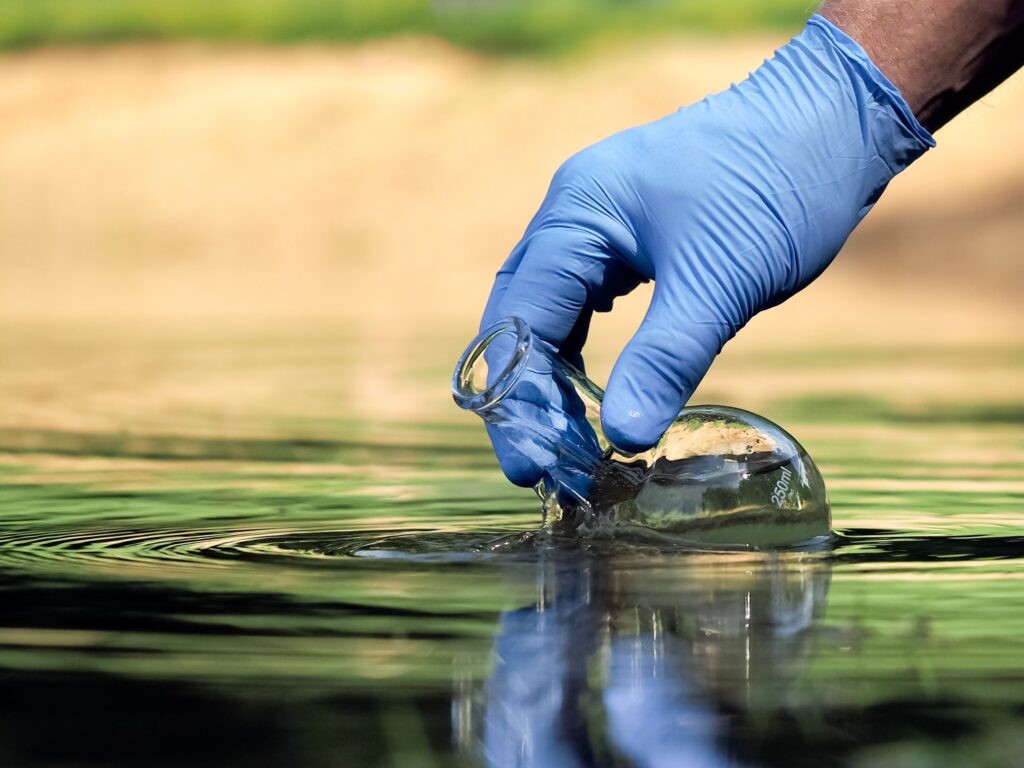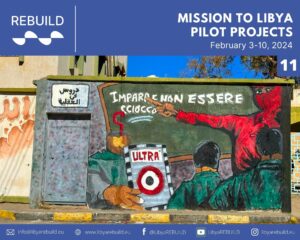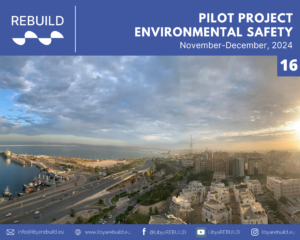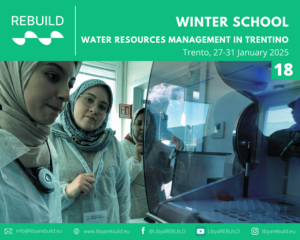
Pilot Project Environmental Safety
Project Coordinator: Autonomous Province of Trento
Implementing partners: Municipalities of Zintan, Sebha, Gharyan, Beni Walid and Azzawiya
Technical implementing partners: University of Trento, International Cooperation Centre (Trento)

Considering the importance of environmental protection, which has become a key competence of Libyan municipalities, and after dialogue with the REBUILD project partners, it was agreed to address the second REBUILD pilot project toward environmental safety, connecting the more theoretical aspects (training) with the practical aspects, i.e. the services provided by the municipality to the population.
The competence of water laboratories is stated among the tasks and competencies assigned to the municipalities by article 25 of Law No. 59 of 2012 and the Health Law, which through Cabinet Resolution No. 856 of 2022 made enforceable the exercise of municipalities’ specific competences and therefore obliged them legally to provide those services. As well, reference is made to the decision No. 1500 of 2022 of the Minister of Local Government regarding the organisational structure of the municipalities, which has established the water laboratory section, competent for both chemical and bacteriological tests. Therefore, the Libyan municipalities are in the process of establishing those laboratories in accordance with the legal and technical requirements.
Area of intervention
The focus is on the quality of drinking water, with a specific action aimed at strengthening the laboratories of five Libyan municipalities: Zintan, Sebha, Gharyan, Beni Walid and Azzawiya.
Reinforcing both equipment and staff capacities for water bacterial analysis has been the main purpose of this pilot in the optic of supporting operations and efficiency of the laboratories within the five municipalities’ Departments of Environmental Sanitation Affairs.
Procurement has been in terms of basic equipment and reagents/kits.
Capacity building was structured as a:
- Training of Trainers (ToT), followed by training delivered to the staff of the laboratories of the municipalities.
- Community of Practice: exchanges between the Libyan municipalities and with the Province of Trento: on-line and through a 1-week winter school in Trentino.
In the REBUILD “environmental safety pilot project”, the following actors were involved:
– Libyan partners: municipalities of Zintan, Sebha, Garyan, Beni Walid and Azzawiyah; MOLG, Regional Environmental Departments.
– European partners: the Province of Trento (coordinator of the pilot project), the International Cooperation Centre and the University of Trento. Since the early 2000s, these three actors have built consolidated experience in working together at local and international level (Libya, Mozambique, Balkan countries).
In the REBUILD project, the University of Trento served as a technical-scientific support partner for the five municipalities involved in this pilot project. The University of Trento participated in the mission to Libya in early February 2024, conducting inspections of laboratories in three of the five municipalities, with the aim of assessing the laboratory situation and the presence of technical personnel. The University of Trento, in collaboration with the MoLG delegate for environment and health, laboratory managers from the five municipalities, and an Italian cooperative specialised in water monitoring (potable, wastewater, and other uses such as bathing), has validated a ToT (Training of Trainers) activity that has been delivered in the form of online video modules and in-presence (1-week). This training material aimed to provide basic theoretical training on the fundamental parameters considered in the assessment of drinking water quality. The lessons focused on the methodology for microbiological quality analysis of drinking water, taking into account the Libyan national regulatory framework and analytical guidelines defined in Italy and the EU. The training process was highly practical, aiming to provide laboratory technicians with operational material to follow to produce a sample, ensuring a quality chain from sampling planning, sample collection and transfer to the laboratory, sample preparation, and data analysis. The topic of data processing and storage has then be discussed in detail, leading to its sharing with the relevant authorities.
—
SEE ALSO:
Interview with Prof. Gianni Andreottola (Trento, January 31, 2025)
Interview with Prof. Guido Zolezzi (Trento, January 27, 2025)
—
Storyboard 11: Mission to Libya. Pilot Projects (February 3-10, 2024)

Storyboard nr 16: Pilot Project Environmental Safety (November-December, 2024)

Storyboard 18: Winter School in Trentino (January 27-31, 2025)

